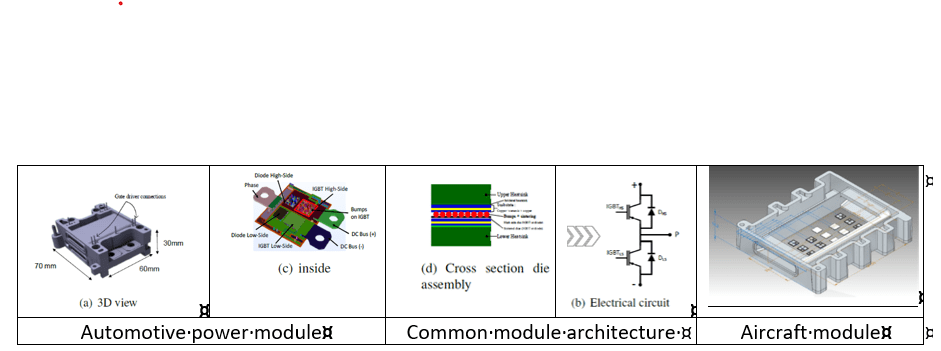Characterization of double side diphasic cooling for innovative power modules
Master thesis- Axis:
- Production, stockage et gestion de l’énergie
- Site :
- Toulouse
- Type:
- Master thesis
- Supervising person(s):
- Jean-Pierre FRADIN
- Start date :
- 2020-02-17
- End date:
- 2022-07-24

Since 2014, the French Institute of Technology Antoine de Saint Exupéry has been developing highly innovating power modules in partnership with two industrial companies: aPSI3D and ACTIA. Since 2017, new designs of the power modules are available, based on SiC MOSFET. Icam in collaboration with LAAS-CNRS is responsible for the thermal characterisation.
The last compact modules consist of three inverter legs based on two power switches in series. Both front and back sides of the MOSFETs are attached to two ceramic substrates, facing one another. This permits an efficient double side cooling of the dice. Depending on the application, automotive versus aircraft, different module architectures exist which are link to the inverter power.
For automotive application, the modules are cooled by glycol water which flows through heat sinks attached to both external sides of the stacking. In order to accurately characterize this compact module structure, different thermo-fluidic test-benches were designed, validated and updated. In the context with a PhD thesis, specific developments have been made for the characterisation of the junction temperatures of dices for the determination of the thermal resistances and impedances. This measurement requires the identification of a thermo-sensitive electrical parameter. Thermal modelling and simulation using a Computational Fluid Dynamics software, 6SigmaET, are also performed in parallel. This strongly coupled thermo-fluidic model takes into account not only the different conductive layers of the module (substrate, chips, bumps, heat sinks, etc.), but also the cooling technology. Consequently, the model allows to compute the junction temperatures of the module.
For aircraft application (More Electric Aircraft), due to the low performance of forced air cooling, diphasic systems may be considered. The Loop Heat Pipe and the air condenser allowing the double side cooling will be received at Icam in January or February 2020. The objectives of the Research Master Thesis Training are to participate to the characterisation of the cooling of the module from a modelling and experimental point of view. For the experimental aspects, thermocouples will be located on the bottom face of the module and the junction temperature of the chips will be determined for different power dissipation level in order to calculate the thermal resistance and the thermal impedance of the module. A dedicated model will be built and correlation between experimental and numerical results will be carried out. A communication would be performed at Therminic in September 2020 in Berlin.
The Master Student will be integrated in a team including Icam Student, PhD and experts (from IRT, LAAS-CNRS and Icam).
- required skills:
-
Heat Transfer ; Thermal management ; measurement